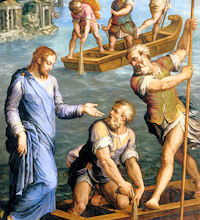» Enjoy our Liturgical Seasons series of e-books!
As He walked by the Sea of Galilee, He saw two brothers, Simon who is called Peter and Andrew his brother, casting a net into the sea, for they were fishermen. And He said to them, "Follow me, and I will make you fishers of men." Immediately they left their nets and followed Him. And going on from there He saw two other brothers, James the son of Zeb'edee and John his brother, in the boat with Zeb'edee their father, mending their nets, and He called them. Immediately they left the boat and their father, and followed Him.
Sunday Readings
The first reading is taken from the Book of the Prophet Isaiah 9:1-4. This reading is another prophecy, concerning the messianic days, given by Isaiah in the eighth century B.C. It describes the new era of liberty and joy, which the future Messiah will usher in.
The second reading is from the first letter of Saint Paul to the Corinthians 1:10-13, 17. St. Paul corrects the Corinthians for the pride that was causing them to form factions and divisions.
The Gospel is from St. Matthew 4:12-23. The true freedom, and the true light which Christ brought to Galilee nearly 2,000 years ago, were brought on earth for us too. The Christian faith, and the Christian knowledge of God's love for us and His infinite interest in our real welfare, are His gift to us and to all men of goodwill, who will accept it. Thanks be to God for this marvelous gift of faith, which frees us from the slavery of paganism and sin, and lights the road to heaven for us, amidst the darkness and drudgery of this life.
But there is a shadow, the shadow of death, over the very greatest of our earthly pleasures. Through our gift of intellect, and the experience of our race, we all know that life on this earth has to end, and no matter how many more years we may think we still have left to us, death will be too soon, far too soon, when it comes. The neo-pagan (the real pagans, who have not heard of the true God, have some god or gods in whom they hope and trust) will do all in his power to forget this dreadful thought of death, but he is reminded of it every day of his earthly life. To live with this thought that all he shall be in eighty years' time is a bucket of lifeless and useless dust, must be an anticipation of the hell he may also have to face after his death.
We love life, we too want to live on, we too know that this cannot be on this earth, but thanks to the merciful revelation given us in our faith, we know that the infinite love of God has prepared a future life for us. We know that Christ, by His life and death as man among us, has made us adopted sons of God. We know we have an eternal life awaiting us, when we depart from this life, and that for the Christian who did his best to be a true follower and disciple of Christ, death is not the end but the beginning of our real life. The grave is not our goal forever, but the key which opens the door to eternal life and eternal happiness for us.
With this divine knowledge revealed to us by and through Christ, everything falls into place in our earthly sojourn. We have our joys and our sorrows, our births and our burials, but we know, with the certainty of God's word, that these are but sign-posts that mark our stages toward, and direct our steps to, our eternal home. We know that our end on earth will be the great awakening to a joy and happiness of which, at present, we can only form a very limited and vague idea. We Christians have indeed seen a great, a heaven-sent light.
Excerpted from The Sunday Readings Cycle A, Fr. Kevin O' Sullivan, O.F.M.






